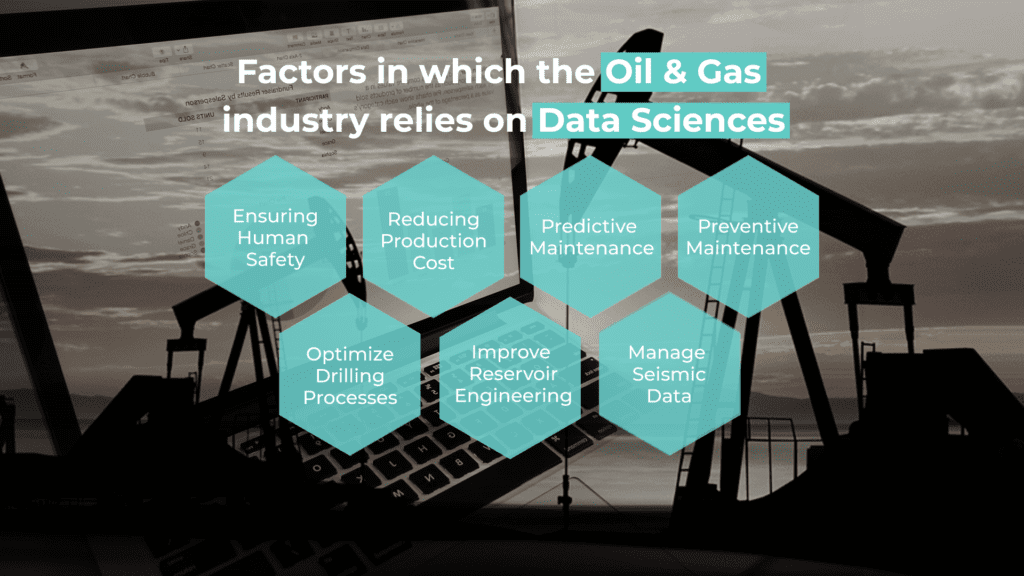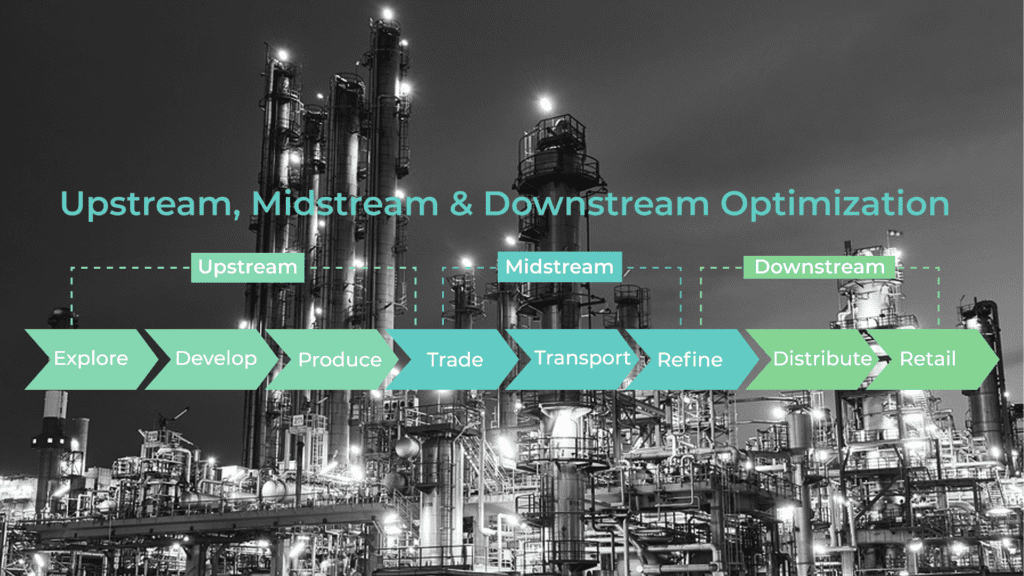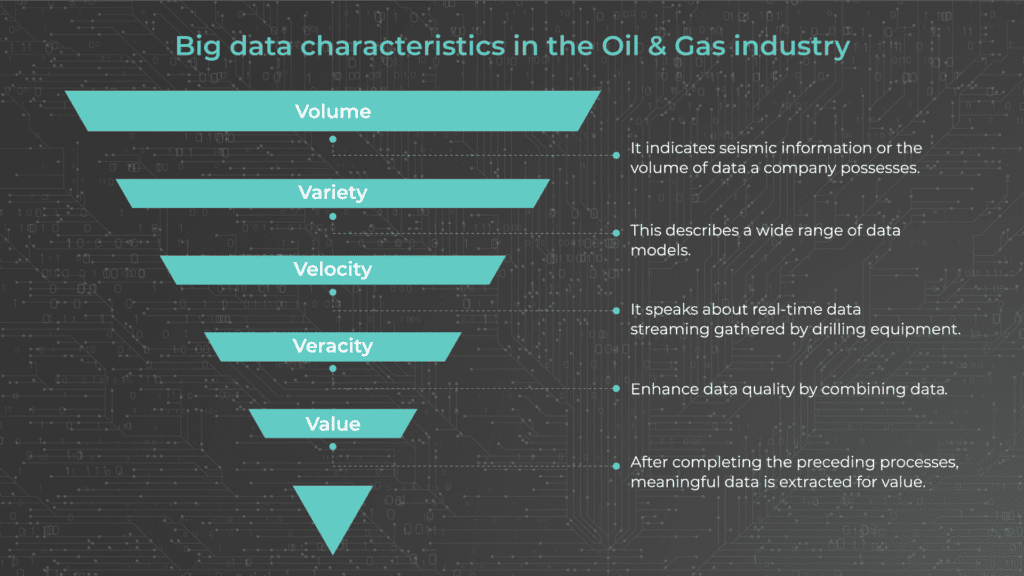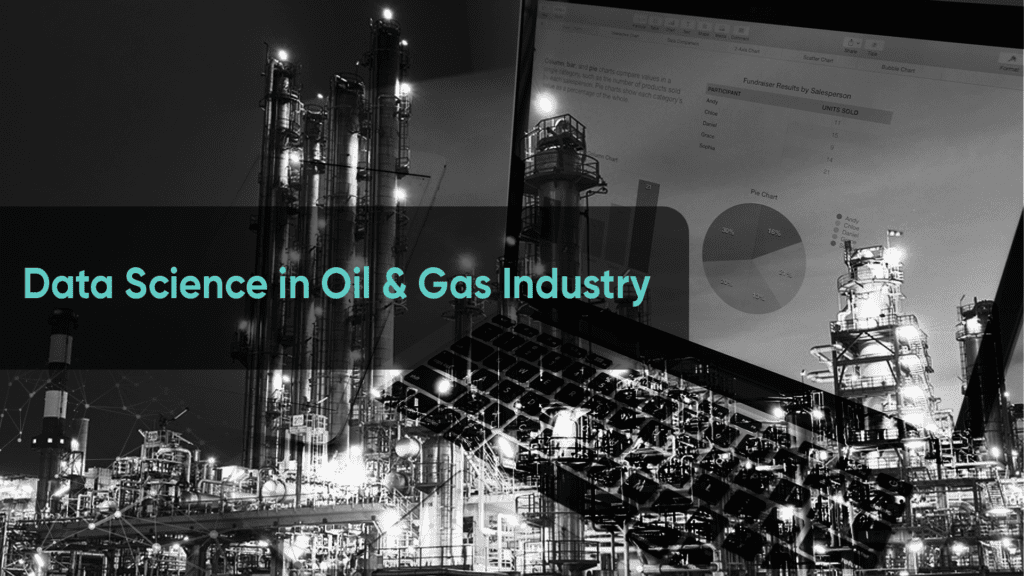Data Science in Oil and Gas Industry
The oil and gas industry has been gathering data, whether it be seismic surveys or data from equipment sensors. Real-time analysis of huge datasets that are being produced and are being retained by historians for years is crucial since many businesses have installed systems to measure production, drilling, and other operations. Big Data in oil and gas industry, which makes use of new technology for handling and processing enormous information, is an evolution of data science.
Large volumes of data are produced every day by the procedures and choices involved in oil and gas exploration, development, and oil and gas production. This kind of data engineering can quickly combine and examine enormous datasets of structured and unstructured data to find undiscovered patterns, fresh connections, trends, customer insights, and other pertinent business data.
When the world is more receptive to the benefits of big data analytics, the oil industry does not appear to be far behind. The vast amount of data must be recognized, gathered, preserved, evaluated, and improved for use since if it is simply kept, it will be of little value.
Big Data Oil and Gas use cases
Data analytics has a significant impact on the Oil and Gas industry, whether it is through the enhancement of return of investment (ROI) or safety precautions. To run its processes, the O&G industry heavily relies on data analytics, which has proven advantageous in several industries of this sector’s advanced analytics.
Here are some important factors in which the oil and gas industry relies on Data Sciences.

- Ensuring Human Safety
- Reducing Production Cost
- Predictive Maintenance
- Preventive Maintenance
- Optimize Drilling Processes
- Improve Reservoir Engineering
- Manage Seismic Data
Upstream, Midstream & Downstream Optimization
Oil and gas companies are explorations, drilling, production, and delivery in the three sectors of upstream, midstream, and downstream oil and gas operations are made simpler with the use of big data analytics.

Big Data in Upstream Oil and Gas Industry:
Upstream analytics get started with seismic data (gathered by sensors) acquired across a potential region of interest in the petroleum search. A drilling location is analyzed and assessed after the data has been obtained. The amount of oil and gas in petroleum reservoirs can be determined by combining seismic data with other data sets (history data of a firm on past drilling operations, research data, etc).
Big Data in Midstream Oil and Gas Industry:
The logistics issue in the oil industry is incredibly challenging. Their main goal is to transport oil and gas safely and without taking any risks. Businesses utilize sensor analytics to guarantee secure shipping for energy products. Organizations use big data in oil and gas market to analyze sensor data from tankers and pipelines to find defects like stress corrosion, fatigue fractures, seismic displacement, etc.
Big Data in Downstream Oil and Gas Industry:
Data analytics in oil and gas industry is used to reduce equipment breakdowns and maintenance expenses, improving asset management. A comparison of the equipment’s operating data from the past and present is done to initially assess its performance.
The performance estimate is further modified in light of the device’s failure scenarios and end-of-life requirements. Finally, the equipment’s projected efficiency is represented and given to maintenance professionals.
Challenges Of implementing big data in the Oil and Gas industry
- One of the major issues with digital oil fields is the data transmission from the field to database processing facilities, which depends on the kind, volume, and protocols of the data.
- The frequency and quality of the data collected are the other issues.
- Understanding the physics of the problem is also extremely challenging. To leverage the appropriate big data analytics technologies and find solutions to the many petroleum engineering difficulties, expert oil engineers should collaborate with data scientists.
- Open-source models, cloud technologies, computer technology, and iterative development methodologies all require experts. For instance, Shell employs more than a hundred individuals worldwide in its data analytics department, which includes about 70 full-time personnel.
Big data characteristics in the oil and gas industry

Volume
It indicates seismic information or the volume of data a company possesses.
Variety
This describes a wide range of data models that can be organized, and unstructured, such as images, videos, and semi-structured, collected from databases using various sensors.
Velocity
It speaks about real-time data streaming gathered by drilling equipment.
Veracity
Enhance data quality by combining data from several phases, such as drilling, seismic analysis, and manufacturing, or by using various integrated models.
Value
After completing the preceding processes, meaningful data is extracted for value.
Conclusion
We have already seen application cases, challenges, how big data analytics is being used in the oil and gas industry, and the opinions of experts.
The oil industry can get a competitive edge thanks to advanced analytics and IoT, which undoubtedly offer a variety of benefits. Increased production and oil recovery rates, improved operations, exploratory innovation, and predictive maintenance are further benefits of sophisticated analytics.
One of the greatest sectors of the world economy is the oil and gas industry. Worldwide population growth is accompanied by a sharp increase in the demand for oil and gas companies. This is how they address the imbalance between supply and demand, as well as the operational challenges faced by experts in the oil and gas data analytics sector.
The oil industry benefits greatly from being a resource-based sector of the economy. Along with the exploration, extraction, refining, transportation, and sale of petroleum products on a global scale, it also encompasses the extraction and extraction of crude oil.
Odyssey Analytics is a software consulting company primarily focusing on the Energy & Commodity domain. Our goal is to provide friendly and responsive support. If you have any questions, feel free to contact us “ info@odysseyanalytics.net ”.
